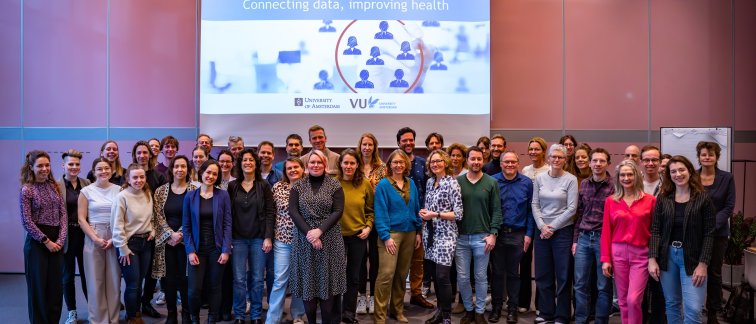Amsterdam UMC, VU, and UvA are proud of their rich collection of population-oriented cohort studies. In these studies, data are collected from large groups of citizens, often regarding lifestyle and health. Notable studies include the Hoorn studies, which follow individuals' development of diabetes; the Netherlands Twin Register (NTR) for research on the heritability of mental and physical health based on a large group of twins and their family members; NESDA to investigate the development of anxiety and depression disorders; and HELIUS, which examines health disparities within different ethnic groups. And there are many others.
These cohort studies already generate a steady stream of scientific output and societal impact. It is impressive to see how the new thinking about open science and FAIR data encourages collaboration between these studies. Therefore, work is being done to strengthen the connections between these studies through the Amsterdam Cohort Hub. Here, about 55 employees of cohort studies (field workers, researchers, data managers, coordinators, data stewards) collaborate on projects to expand and integrate their joint infrastructure. This program is coordinated by Amsterdam Public Health and facilitated by sector funds from the Ministry of Education and Science.
In November, five communities and seven working groups started. By bringing together knowledge from different cohort studies, faster learning and the development of sustainable solutions are possible. Topics being worked on include:
- Collaboration in terms of participant policy, sharing of materials, joint appointments, and training/professionalization of staff
- Harmonization in terms of collecting, coding, storing, and making data accessible
- Making data machine-readable towards data FAIRification
- Development of a data catalog and website to make data from cohort studies more available to external researchers and parties with research questions
- Tailoring the specific support needed by cohort studies to perform their work effectively
During the Midterm meeting on March 13th, it was evident that there is significant dedication to these and other topics, and the enhanced collaboration between the cohort studies is already yielding benefits. The groups are now returning to their next assignments to realize this project. The next major milestone is the first annual conference of the Amsterdam Cohort Hub on July 3rd, where several results of the work will be presented. In the coming months, work will include a demo of a common website with data catalog, the future structure and leadership of the hub, the final name and branding of the hub, and a common data sharing policy.
Contact us!
Those interested can request more information about the Amsterdam Cohort Hub or subscribe to the monthly newsflash about it at cohorthub@amsterdamumc.nl.
For more information, see also the Amsterdam Cohort Hub website.

